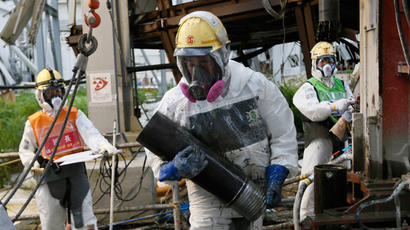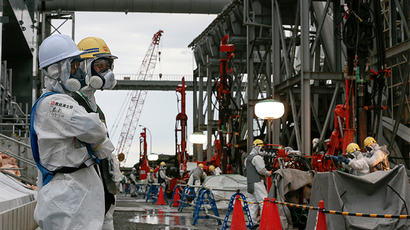Abnormalities in Japanese monkeys linked to Fukushima nuclear disaster

Monkeys living in the wild in the Fukushima region have tested positive for blood abnormalities linked to radioactive fallout from the 2011 nuclear power plant disaster, according to a new report.
The wild monkeys, Japanese macaques popularly known around the world for their habit of bathing in the country’s hot springs, have demonstrated blood abnormalities that could leave them vulnerable to infectious diseases, reported the Guardian.
Specifically, the monkeys in the region which was impacted by fallout from the stricken Fukushima Daichii nuclear facility, were found to exhibit low white and red blood cell counts, along with low hemoglobin levels. The study examined a 61 monkey community living 44 miles from the disaster site to 31 monkeys almost 250 miles away, in the Shimokita Peninsula. The former community tested positive for radioactive caesium, linked to caesium in the soil of their habitat.
The macaques feed on tree buds and bark where caesium can accumulate in high concentrations during winter, according to professor Shin-ichi Hayama of the Nippon Veterinary and Life Science University in Tokyo, who spoke to The Guardian.
Though the study has examined monkey populations rather than humans, the findings may nonetheless add further weight to criticism of Japan’s nuclear operating corporation, TEPCO, which has previously been harshly judged over its handling of the Fukushima disaster, in particular its downplaying of risk to both plant workers and the impact to the surrounding prefecture. Some 50,000 households were displaced following the nuclear disaster, and the utility has struggled to contain radioactive spills during the massive cleanup operation of the site.
Still, some critics say that the research on the nearby primates is not conclusive, and that the cesium levels may not be to blame for the monkeys’ blood abnormalities.
Professor Jim Smith of the University of Portsmouth in Britain is skeptical that the cesium levels, similar to those found elsewhere in Europe following the April 1986 Chernobyl nuclear incident, were too low.
“I am highly skeptical of the claim. The levels of radiocaesium in the Fukushima monkeys are about the same as those found in sheep in some parts of the UK following the Chernobyl accident, i.e. extremely low in terms of damage to the animals themselves. I think it much more likely that the apparently low blood cell counts are caused by something other than radiation.”
Professor Geraldine Thomas of Imperial College London, meanwhile, told the Guardian that the link between cesium levels and the macaques’ blood results for the Fukushima research was not statistically significant.
“Unfortunately this is yet another paper with insufficient power to distinguish real effects and relevance to human health,” she said. “We know that one of the most damaging health effects comes from fear of radiation, not radiation itself.”
According to the researchers who conducted the Fukushima study, both disease and malnutrition were ruled out as a root cause for the monkeys’ blood abnormalities.















